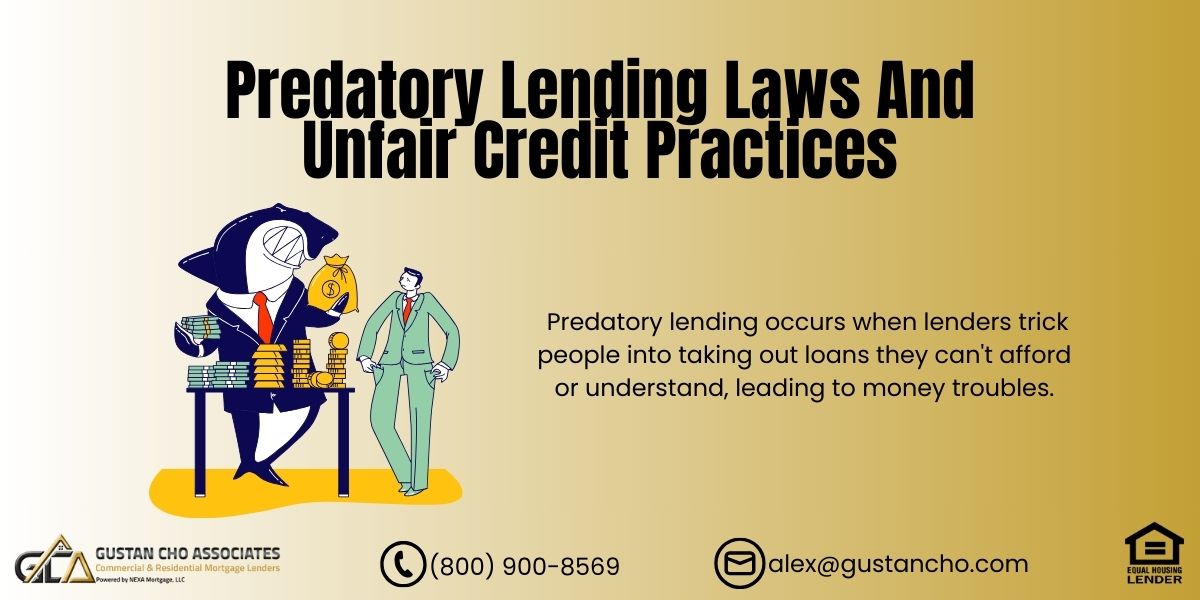What is Predatory Lending? Protect Yourself Today!
Have you ever worried about being tricked when getting a mortgage or loan? You’re not alone. Predatory lending is a real threat, and knowing what it is can save you from losing money, damaging your credit, or even losing your home. At Gustan Cho Associates, we believe everyone deserves a safe and fair mortgage experience. Let’s dive in to make sure you’re protected.
What is Predatory Lending?
It refers to the unethical practice where lenders exploit borrowers by offering loans that are either unaffordable or difficult to comprehend. This method aims to advantage lenders while disadvantaging borrowers, frequently resulting in dire financial repercussions for those who become prey to it. Predatory lending can occur across various financial products, including mortgages, car loans, payday loans, and credit cards. By manipulating terms and conditions, these lenders create a cycle of debt that can be hard to escape.
Victims of this unlawful practice often include the most vulnerable members of society—such as seniors, minorities, and individuals undergoing financial hardships. Certain groups might not possess the financial knowledge or resources necessary to completely grasp the consequences of the loans presented to them. This is because they do not qualify for government and/or conventional loans but do with alternative financing.
As a result, they may unknowingly enter into agreements that put them at a significant disadvantage, exacerbating their financial struggles. Addressing predatory lending is essential to protect consumers and promote fair lending practices that support rather than exploit those in need.
Avoid Predatory Lending – Protect Your Financial Future
Apply Now And Get recommendations From Loan Experts
How Does Predatory Lending Work?
Predatory lenders often:
- Charge high fees without clearly explaining them
- Pressure you into loans you can’t repay
- Hide important loan terms or fees in confusing language
- Encourage refinancing repeatedly (also called mortgage flipping) to collect fees
For example, imagine you urgently need money after losing a job. A predatory lender sees your desperation and offers you a mortgage or loan with very high interest. Because you need cash quickly, you might not realize you’re trapped in a debt cycle.
Who Do Predatory Lenders Target?
Prior to the 2008 Real Estate and Credit Collapse, predatory lending has been very common in the mortgage business and it was the major cause of the Great Recession. Mortgage Loans on properties are collateralized by the homeowner’s home.
Predatory Lenders targeted homeowners with equity and funded loans against their properties without regard to them having the ability to repay their loans. They got high-interest monthly payments. PLUS profited when the homeowner could not repay their loans and from the proceeds of the foreclosure when the borrower defaulted on their mortgages.
Predatory lending targets people who may not fully understand loan terms or those desperate for fast money. Common targets include:
- Older adults or retirees
- Minorities or immigrants who might have language barriers
- People with poor credit
- Those with lower incomes
Understanding these can help you identify predatory lending sooner, helping you steer clear of becoming a victim.
Recent Updates and Laws Against Predatory Lending
In 2024, state and federal laws strongly protect borrowers against predatory lending. Acts like the Dodd-Frank Wall Street Reform and Consumer Protection Act and agencies like the Consumer Financial Protection Bureau (CFPB) strictly enforce lending fairness. They require lenders to clearly explain loan terms, fees, and costs before you sign anything.
New rules mean lenders must verify your ability to repay the loan. If they don’t, they could face huge fines and legal trouble. Still, predatory lending hasn’t disappeared—it’s just become sneakier.
Warning Signs of Predatory Lending
Watch out for these red flags:
- Lenders rushing you or pressuring you to sign quickly
- Extremely high interest rates or confusing loan terms
- Extra fees hidden in the loan paperwork
- Offers of loans that “guarantee” approval regardless of your credit
If you experience any of these, step away immediately and contact a trustworthy lender instead, like Gustan Cho Associates.
Real-Life Examples of Predatory Lending
Here are common examples:
- Balloon Mortgages: Low monthly payments initially sound great. But later, you must pay a considerable lump sum. Many borrowers can’t afford this, leading to foreclosure.
- Negative Amortization Loans: Monthly payments don’t even cover interest, causing your loan balance to grow larger over time.
- Loan Packing: Lenders sneak unwanted extras into your loan—like insurance or unnecessary services—to increase costs.
- Mortgage Flipping: Lenders repeatedly encourage refinancing to charge more fees, leaving borrowers in endless debt.
Predatory lending practices can trap you in high-interest loans, excessive fees, and unfair terms
Apply Now And Get recommendations From Loan Experts
What Should You Do if You’re Facing Predatory Lending?
If you think you’re dealing with predatory lending:
- Stop immediately. Do not sign any documents.
- Get a second opinion. Talk to someone you trust or contact a reputable lender like Gustan Cho Associates.
- Report the lender. File complaints with the Consumer Financial Protection Bureau (CFPB) and your state’s attorney general.
- Seek legal advice. Contact a housing counselor or legal advisor to protect your rights.
How Gustan Cho Associates Can Help
At Gustan Cho Associates, we put borrowers first. Here’s how we help you avoid predatory lending:
- Transparency: We clearly explain every detail of your loan—no hidden fees or confusing terms.
- Personalized Advice: Our expert loan officers take time to understand your financial situation and find a loan you can truly afford.
- Ethical Standards: We follow strict laws and guidelines to protect you every step of the way.
Tips to Avoid Predatory Lending
- Shop Around: Evaluate loan proposals from various lenders to identify the most favorable option.
- Ask Questions: Always inquire with your lender about fees, terms, and conditions.
- Read Carefully: Always read loan documents closely. Ask for clear explanations if terms seem confusing.
- Check Licensing: Verify your loan officer is licensed and reputable.
Why Choose Gustan Cho Associates?
When you choose Gustan Cho Associates, you’re choosing trust, integrity, and peace of mind. We understand mortgages can be overwhelming, but our goal is to find you the best mortgage without stress or worry.
With Gustan Cho Associates, you get:
- Honest and clear communication
- Easy-to-understand terms
- A dedicated loan officer guiding you from start to finish
Don’t risk your financial security by falling for predatory lending schemes. Trust Gustan Cho Associates for the mortgage experience you deserve.
Ready for a Safe Mortgage Experience?
If you want to avoid predatory lending and work with a lender who truly cares about your financial well-being, contact Gustan Cho Associates today. We promise transparency, fairness, and dedication every step of the way.
Bid farewell to uncertainty and welcome assurance. Your mortgage should support you rather than cause you stress, and we’re here to ensure that happens. Protect yourself. Get the loan you deserve. Contact Gustan Cho Associates today at 800-900-8569 or gcho@gustancho.com, and let us show you the right way to get your mortgage.
Frequently Asked Questions About Predatory Lending:
Q: What Exactly is Predatory Lending?
A: Predatory lending occurs when lenders trick people into taking out loans they can’t afford or understand, leading to money troubles.
Q: Who Usually Becomes a Victim of Predatory Lending?
A: Victims of predatory lending are often older adults, minorities, people with lower incomes, or anyone who urgently needs money.
Q: How Can I Tell if a Loan Offer is Predatory Lending?
A: Beware of lenders who rush you, hide fees, offer loans “no matter your credit,” or charge extremely high interest rates.
Q: What Should I do if I Think I’m Facing Predatory Lending?
A: Stop immediately, don’t sign anything, talk to a trusted lender like Gustan Cho Associates, and report it to authorities.
Q: Are There Laws That Protect Me From Predatory Lending?
A: Yes, laws like the Dodd-Frank Act and agencies like the CFPB protect borrowers from predatory lending by requiring lenders to follow transparent and fair rules.
Q: What are Common Examples of Predatory Lending?
A: Balloon mortgages, negative amortization loans, hidden fees, loan packing, and mortgage flipping are all examples of predatory lending.
Q: Why do Predatory Lenders Target People with Poor Credit?
A: Predatory lenders target people with poor credit because they’re often desperate for loans and might overlook unfair loan terms.
Q: Can Gustan Cho Associates Help Protect Me from Predatory Lending?
A: Yes, Gustan Cho Associates protects you by clearly explaining loans, being honest, and offering loans you can truly afford.
Q: How do I Make Sure a Loan Officer isn’t Involved in Predatory Lending?
A: Always check if your loan officer is properly licensed, clearly answers your questions, and doesn’t pressure you to sign quickly.
Q: Why Should I Trust Gustan Cho Associates to Avoid Predatory Lending?
A: Gustan Cho Associates puts your safety first, explains loan details clearly, and helps you find a loan that fits your budget without any tricks.
This blog about “Predatory Lending Laws And Unfair Credit Practices” was updated on March 25th, 2025.
Ask questions and ensure you understand every detail before signing
Apply Now And Get recommendations From Loan Experts








